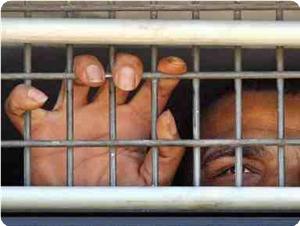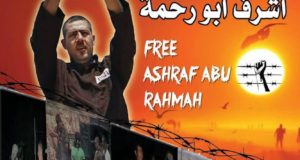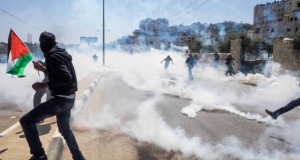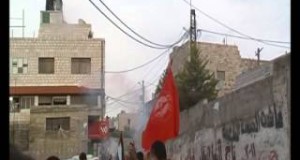by Alistair George
2 November 2011 | International Solidarity Movement, West Bank
Below is an abridged transcript of talks given by Palestinian former-prisoners, (released as part of the Hamas-Shalit deal) at PASSIA (Palestinian Academic Society for the Study of International Affairs ) Roundtable on ‘Prisoner Release – Palestinian Narratives’ on 31 October 2011.
I was captured on the 28 March 1990. The Israelis entered my house with explosives and dogs; they didn’t care about the fact that there were children in the house. My son was two years old then and my daughter was one years old. My wife was three months pregnant. It was really horrifying for them and my daughter couldn’t speak for one year afterwards.
I will never forget those moments or the look on my family’s faces when the whole house, the walls, everything was demolished. I was taken to an interrogation facility and on the way I was hit with everything that they had in their hands, including their rifles.
I was interrogated for 50 days, during which I was tortured. I was deprived of sleep, they made me sit in a special way of sitting, handcuffed from behind. I was exposed to extreme temperatures – both extreme cold or heat. I can’t really explain how these methods affected me. Afterwards I knew that my wife was also interrogated. Once the interrogation ended I was transferred to prison. During the transfer I was also hit and when I arrived the way they accepted me was very cruel; each prisoner was handcuffed together by their hands and their legs and we entered a cell which had nothing in it, except for the walls.
I was suffering continually. We asked the prison authorities for a long time to improve our conditions. They improved some of our conditions but they were less than the minimum expected for an acceptable existence.
When it came to transferring me to court, it was living hell. Usually they used to come early in the morning and handcuff two prisoners together and take us by bus into a detention centre in Ramallah. We used to stay there for several days in a room situated underground, it was very overcrowded. Sewage pipes passed across the ceiling and they were leaking all the time. There were rats, cockroaches – the smell was awful.
Because of that and because we wanted to improve our conditions, the only move we had was to go on hunger strike. It was a very cruel method but it was the only method that we had. It can be said that it’s negative or passive resistance. We used to throw all the food that they tried to give us outside the cells. We don’t just have to face the hunger but also what the Israelis did to us – searching the rooms, hitting us. Some of the prisoners were transferred to other prisons, others were put in solitary confinement. Hunger strike is like death itself but unfortunately we used to get our rights only when we used to go through this experience.
Even after we got our rights after these hunger strikes, usually they take all these achievements that we reached away again slowly and because of that we had to go on hunger strikes each year or two because the situation in jail is really bad. Each prisoner has only 1m2 where he has to live and do everything during the day time. During these hunger strikes many prisoners died.
I want to talk about the resistance of the Palestinian people. We don’t like killing. We resisted the occupation because we wanted liberty, we wanted to ensure our children’s future. Israelis say that we are terrorists and our hands are covered in blood but they forgot that their leaders are drowned with Palestinian blood – especially Sharon and Netanyahu. All Israeli leaders committed crimes against Palestinian people. I can’t really talk about the suffering I went through for 23 years in this short period of time.
Ibtisam Issawi
I am the mother of four daughters and two boys. I spent 10 years in prison, I was sentenced to 15 years.
If prison is so difficult for a man, imagine how it is for a woman. Israel always claims that it is the only democracy in theMiddle East, and that there is equality between men and women but this is something we only hear and don’t see on the ground. From the moment I was arrested I was treated very badly, they didn’t give any importance to the fact that I was a woman – I was also hit, humiliated.
I was arrested in 2001 and maybe in this period there is no more physical torture but there is psychological torture. They used to insult me and use very bad words – I think that such words shouldn’t be used by someone who thinks that they’re a democrat.
They always used to threaten me by [invoking] my family and used to imply that Palestinian women when they resist occupation they don’t do it for the sake of resistance but for social problems, this is not the truth.
Regarding transfer between prisons and from court; they didn’t take any consideration to the fact that I’m a woman and I have other needs than a man. Sometimes it took long hours, sometimes over one day. We didn’t have any privacy in jails, they used to enter our cells whenever they wanted to search and sometimes to search us naked.
At the beginning of my imprisonment I was in Ramle prison, there I was treated not as a security detainee but rather as a criminal one and I was treated the same way as people that were murderers and people convicted of robbery or prostitution. They were always searching us because they used to always claim that we might enter some drugs into prison. Because of this we had to go on hunger strike to ask for our rights – because of that they treated us very badly and sometimes they used to try to force the needle of glucose into our arms to stop the strike.
My family lives in Jordan and my father is really old so he couldn’t visit me. I always used to ask them to at least give me one phone call to speak with my father but they always refused saying that phone calls are only allowed when someone from the family dies.
Although we were in prison we used to try to have some kind of celebration to mark our holidays but they didn’t even let us put up some decorations to celebrate Eid. They always used to say that ‘you are in prison not in a hotel’.
Palestinian prisoners are known to be well educated; although there was bad treatment, we managed to study in universities and to turn the prison into a university. And even when it comes to studying, they always waited for the right moment to prevent us from studying, another reason why we had to go on hunger strikes. I’ve been released now for 2 weeks and they’ve put so many restrictions on us. For example, we are not allowed to enter the West Bank but the problem is that most of my family and my brothers live there – they can’t come toJerusalemand I can’t go and meet them.
Nasser Abed Rabbo
I was arrested 23 years ago – on 9 February 1988. I still ask – why was I taken away from my city [Jerusalem] and my beloved ones? I want an answer because I’m still under occupation.
I was arrested from my house – they destroyed everything in the house. I was handcuffed and blindfolded. My arrest was not usual – I was not taken straight from my house to the police car; they took me through several neighbourhoods in my village, a very long distance – almost 2km, in order for the people in the village to see. I was hit, especially on the head, and everyone saw me bleeding. I think the purpose of this was to make me an example for any other person who tries to resist occupation.
After interrogation I was taken to prison, this period of time is very important for the prison authorities and for the intelligence. They all tried to exert psychological pressure on us and also during our transfer from prison to court. They do this in order to make us finish our trials as soon as possible and not deny the charges. They all imply that if you do so then the whole phase of torture and ill-treatment will come to an end.
The Israelis always over-exaggerate in the media that they arrested a terror cell that was responsible for killing lots and lots of Israelis. Yet lots of the times these people were imprisoned for 1, 2, or 3 years in prison. The purpose for this action in order to show that the Israeli people that they [the security forces] actually work and achieve things and on the other hand to show that Palestinians are terrorists.
Capturing our bodies between four walls, the reason is not just the act of capturing but also to capture our minds and to take us away from the society in which we used to have an active part. They always used to put us in very small society circles and they prevented our family members from visiting us and restricted our family members from visiting unless they were first degree family members.
They also restricted the number of TV channels that we could watch and even radios didn’t work without an antennae. Although we were allowed to have TVs, we weren’t allowed to have control over which channels we watched. They also prevented us from studying in Palestinian universities. All of this was to prevent us from being a part of society to prevent us from understanding what was going on outside.
The laws that govern Israeli prison authorities entered into force in the 1970s and most of the provisions of these laws are not used. They don’t take into consideration that the world is developing all the time and our treatment partly relies on these laws.
Palestinian prisoners represent all sectors of the Palestinian people. There are also some prisoners who are from other Arabic countries and from all political parties. Since the beginning of the occupation, prisoners tired to stay in touch with the political parties outside and tried to transfer these parties into prison as we believe that we are fighting for a just cause. Everyone had the feeling that we had an obligation to continue resisting, even inside prison. This was named the Palestinian Prisoners Movement – the Israelis didn’t like this movement and it was treated very badly. They tried to impose policies and regulations and categorize prisoners as terrorists.
In the 1970s in some prisons there were factories that used to manufacture the shields that were used to cover tanks. Tanks that kill our people. They tried to force prisoners to work in these factories in order to undermine our struggle and keep them away from their national cause. But the determination of prisoners inside prison was a direct reason for forming a national unity with all parties and there were laws that governed the relation between the Palestinian parties in jail. This was in order to ensure prisoners had the continuance of life and ensure that had a certain quality of life. This movement was very strong, although the Israeli prison authorities always tried to weaken this body.
Hunger strikes allowed us to gain some of our rights and those who say that the prisoner authorities are the ones that gave us these rights are lying, we used to get these rights by fighting and preventing our bodies from eating. It was the only strategic weapon that we could use against the prison authorities to get our rights.
Ali Maslamani
I spent 30 years in prison. We live inside jails under one highlight – the struggle of wills. National dignity and humanity. We succeeded using civil and organized life to live in pride. We are optimistic – even inside jail. Because we are right holders. I say optimistic but not perfectionist – because we know what reality is like.
We achieved many physical achievements but the most important achievements are the moral ones. Life in prison became a very unique kind of life – everyone respected the other. I have to say that I’m really happy and words can’t express what I feel now I am free and I am among my family and friends.
When I was released I started feeling time. The problem in prison is that you don’t feel time – we used to call time in prison ‘compressed time’ because there are no incidences, nothing happens, each day is the same. But when I was released I told my mother that only in one day I did so many things and went to so many places and this is the value of freedom.
After we met our families and friends we forgot all the suffering and we knew that it was not for nothing. We wonder whether this will help the awareness of our people and we also say that we will also be soldiers in order to help our people.
We think that this is a continuous ceremony where the Palestinian people are celebrating their own sons that came to liberty. Every single one of us is a big humanitarian case. I’ve seen so many emotional scenes in my life but it was an amazing scene when we went out of prison and we saw how our families and friends shared our happiness and congratulated us. There is a need for a poet to really explain how we felt.
In prison everyone has their own case – some throw stones, some did an operation, others killed Israelis but when we are asked about this we never brag about this, we always say that we resisted occupation in order to get liberty and to live in pride and have our own country.
We used to send letters to national personalities and we always called for peaceful resistance for our people because we think bloodshed should stop and our people have the right to live on this land with holy Jerusalem as its capital. Today UNESCO accepted Palestine as a full member and because of that we will keep being optimistic.
Alistair George is a volunteer with International Solidarity Movement (name has been changed).
 International Solidarity Movement Nonviolence. Justice. Freedom.
International Solidarity Movement Nonviolence. Justice. Freedom.



